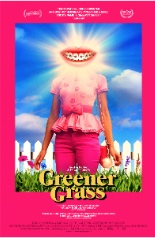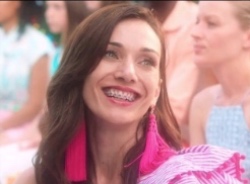
 When committing to a viewing of Greener Grass, it’s important to know what you’re in for: Not even four minutes in, the lead character gives her baby away to her admiring best friend. This on-a-whim ceding of parental rights is played for laughs.
When committing to a viewing of Greener Grass, it’s important to know what you’re in for: Not even four minutes in, the lead character gives her baby away to her admiring best friend. This on-a-whim ceding of parental rights is played for laughs.
If you don’t find any humor in that (much less the incontinent grade schooler to come), I offer these irrefutable, inconvenient truths:
1. Greener Grass is most decidedly not for you.
2. You are wrong.
Expanded for the better from its creators’ 2015 short, Greener Grass is not only the funniest film of the year thus far, but destined to grow in estimation as the right audiences find it (versus the other way around) and a fervent cult forms. Much like David Byrne’s initially ignored, now-celebrated True Stories, its loose vignettes form an absurdist whole that redefines deadpan.
 Written and directed by its stars, Upright Citizens Brigade alum Jocelyn DeBoer and Dawn Luebbe, this satire of the suburbs posits an upper-middle-class middle America covered in a puke of pastels — a neighborhood where golf carts have replaced cars, children bear names like Citronella, and all the adults wear braces on their teeth. Those smiles may be forced, but the movie’s humor isn’t. Lines such as “Do people like my peas?” aren’t read as jokes, because the cast — including current Saturday Night Live utility player Beck Bennett — exudes confidence in knowing viewers attuned to Grass’ admittedly narrow wavelength of peculiarity will catch them.
Written and directed by its stars, Upright Citizens Brigade alum Jocelyn DeBoer and Dawn Luebbe, this satire of the suburbs posits an upper-middle-class middle America covered in a puke of pastels — a neighborhood where golf carts have replaced cars, children bear names like Citronella, and all the adults wear braces on their teeth. Those smiles may be forced, but the movie’s humor isn’t. Lines such as “Do people like my peas?” aren’t read as jokes, because the cast — including current Saturday Night Live utility player Beck Bennett — exudes confidence in knowing viewers attuned to Grass’ admittedly narrow wavelength of peculiarity will catch them.
The ostensible plot — a yoga-teacher neighbor is murdered by the local grocery store bagger — is, much like the characters DeBoer and Luebbe so skillfully skewer, just for show. That both ladies very much look the part makes their pic all the more deliciously subversive. —Rod Lott
